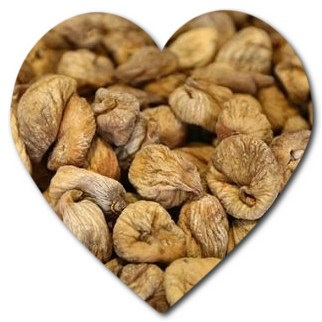Is it OK to eat dried figs everyday?
Eating dried figs every day can be a healthy part of your diet, but like any food, it should be consumed in moderation as part of a balanced diet. Dried figs are a good source of dietary fiber, vitamins, and minerals, including potassium, calcium, iron, and magnesium. They also provide antioxidants and can be a nutritious snack option.
The fibers it contains help accelerate bowel movements and relieve constipation. It helps to lose weight as its high fiber content provides a feeling of satiety. It supports bone and dental health thanks to the calcium it contains. It is also useful against bone resorption in women during menopause.
Here are some considerations:
- Calorie and Sugar Content: Dried figs are calorie-dense and contain natural sugars, so if you consume them excessively, it could contribute to excessive calorie intake and potentially affect blood sugar levels.
- Fiber Intake: While the fiber in dried figs can be beneficial for digestion and can help you feel full, consuming too much fiber at once can lead to digestive discomfort, such as gas or bloating. Ensure you drink enough water to help digest the fiber.
- Variety in Diet: It’s important to have a varied diet that includes a wide range of foods to ensure you get a broad spectrum of nutrients. Don’t rely solely on dried figs for your nutritional needs.
- Allergies or Digestive Sensitivities: Some individuals may be allergic to figs or experience digestive sensitivities to them, so it’s crucial to listen to your body and adjust your consumption accordingly.
- Portion Control: Be mindful of portion sizes. A small handful of dried figs (around 2-4 figs) is typically a reasonable serving size.
- Added Ingredients: Check the ingredient list when buying packaged dried figs, as some products may contain added sugars or preservatives.
- Interactions with Medications: If you’re taking certain medications, such as blood thinners, consult with your healthcare provider because figs contain vitamin K, which can affect blood clotting.

In summary, dried figs can be a healthy addition to your diet when consumed in moderation as part of a balanced and varied eating plan. However, if you have specific dietary restrictions, allergies, or medical conditions, it’s advisable to consult with a healthcare professional or registered dietitian for personalized dietary guidance.
How many dry figs can you eat a day?
The number of dried figs you can eat in a day depends on various factors, including your individual dietary needs, overall calorie intake, and how your body responds to them. However, here’s a general guideline to help you incorporate dried figs into your diet:
A reasonable daily portion of dried figs is about 2-4 figs. This portion size provides a moderate amount of calories, dietary fiber, vitamins, and minerals without overloading you with excessive sugar and calories.

It’s essential to consider your overall diet and nutritional goals when determining your dried fig consumption. If you’re trying to manage your calorie intake or sugar consumption, you may want to stick to the lower end of this range. Additionally, be mindful of your daily fiber intake, as consuming too much fiber all at once can lead to digestive discomfort.
As with any food, it’s crucial to listen to your body. Some individuals may tolerate larger portions of dried figs without any issues, while others may find that even a small portion causes digestive discomfort. Pay attention to how your body responds and adjust your intake accordingly.
If you have specific dietary concerns, such as managing blood sugar levels or following a particular diet plan, it’s a good idea to consult with a registered dietitian or healthcare provider for personalized guidance on how many dried figs are appropriate for your individual needs and goals.
Are dried figs good for you?
Dried figs can be a nutritious addition to your diet when consumed in moderation as part of a balanced eating plan. They offer several health benefits:
- Nutrient Density: Dried figs are a concentrated source of nutrients. They provide vitamins like vitamin K, B vitamins (particularly B6 and folate), and minerals such as potassium, magnesium, calcium, and iron. These nutrients are essential for various bodily functions, including bone health, energy metabolism, and blood clotting.
- Dietary Fiber: Dried figs are rich in dietary fiber, which is beneficial for digestive health. Fiber can help prevent constipation, promote regular bowel movements, and contribute to a feeling of fullness, which may aid in weight management.
- Antioxidants: Dried figs contain antioxidants, including polyphenols, which can help protect your cells from oxidative damage. Antioxidants play a role in reducing the risk of chronic diseases.
- Natural Sugars: While dried figs do contain natural sugars, they are not heavily processed like many sugary snacks. The sugars in dried figs are accompanied by fiber, which can help stabilize blood sugar levels.
- Potassium: Dried figs are a good source of potassium, a mineral that supports heart health by helping regulate blood pressure and maintaining proper muscle and nerve function.
- Iron: They also provide iron, which is important for preventing iron-deficiency anemia and supporting oxygen transport in the body.
However, it’s essential to consume dried figs in moderation due to their calorie density and sugar content. They are calorie-dense, and overeating dried figs can contribute to excessive calorie intake and may affect blood sugar levels, especially if consumed in large quantities.
Additionally, some people may have allergies or digestive sensitivities to figs, so it’s essential to listen to your body and adjust your intake accordingly.
As with any food, dried figs are best enjoyed as part of a diverse and balanced diet. If you have specific dietary concerns or health conditions, it’s advisable to consult with a registered dietitian or healthcare provider to determine how dried figs fit into your individual nutritional needs and goals.
Benefits of dried figs for men
Dried figs offer several potential benefits for men when incorporated into a balanced diet:

- Rich in Nutrients: Dried figs are a concentrated source of essential nutrients, including vitamins, minerals, and dietary fiber. These nutrients support overall health and well-being.
- Heart Health: The potassium content in dried figs can help regulate blood pressure, potentially reducing the risk of heart disease. A diet rich in potassium is associated with better cardiovascular health.
- Bone Health: Dried figs contain calcium and vitamin K, both of which are essential for bone health. Adequate calcium intake is necessary for maintaining strong bones, and vitamin K plays a role in bone metabolism.
- Digestive Health: Dried figs are high in dietary fiber, which promotes regular bowel movements and helps prevent constipation. A healthy digestive system is important for overall well-being.
- Energy Boost: Dried figs provide a natural source of carbohydrates and sugars, making them a good option for a quick energy boost, especially during physical activities or workouts.
- Iron Content: Iron is essential for carrying oxygen in the blood. Dried figs contain iron, which can help prevent iron-deficiency anemia, a condition that can affect both men and women.
- Antioxidants: Dried figs contain antioxidants, including polyphenols, which can help protect cells from oxidative stress. Antioxidants are associated with a reduced risk of chronic diseases and may support overall health.
- Prostate Health: Some studies suggest that a diet rich in fruits and vegetables, including figs, may have a protective effect on prostate health. The antioxidants and phytochemicals in these foods are thought to play a role in reducing the risk of prostate issues.
It’s important to note that while dried figs offer these potential benefits, they should be consumed in moderation. They are calorie-dense and contain natural sugars, so excessive consumption can lead to an excessive calorie intake and may affect blood sugar levels. How many dried figs should I eat a day to lose weight? >>
For personalized dietary advice and to determine how dried figs fit into your specific nutritional needs and goals, it’s advisable to consult with a registered dietitian or healthcare provider. Additionally, a well-rounded diet that includes a variety of fruits, vegetables, whole grains, lean proteins, and healthy fats is essential for overall health and well-being for both men and women.
Benefits of dried figs for women
Dried figs offer several potential benefits for women when incorporated into a balanced diet:
- Nutrient Density: Dried figs are a concentrated source of essential nutrients, including vitamins, minerals, and dietary fiber. These nutrients support overall health and well-being, which is important for women of all ages.
- Bone Health: Dried figs are a good source of calcium and vitamin K, both of which are crucial for maintaining strong bones. Adequate calcium intake is especially important for women, as they are more prone to osteoporosis later in life.
- Digestive Health: The high fiber content in dried figs promotes regular bowel movements and helps prevent constipation, a common issue for many women.
- Iron Content: Iron is essential for women to prevent iron-deficiency anemia, which is more common in women due to menstruation and pregnancy. Dried figs provide a source of dietary iron.
- Heart Health: The potassium in dried figs can help regulate blood pressure and support cardiovascular health. Heart disease is a leading cause of death among women, so maintaining heart health is crucial.
- Antioxidants: Dried figs contain antioxidants, including polyphenols, which can help protect cells from oxidative stress. Antioxidants may contribute to reducing the risk of chronic diseases.
- Energy Boost: Dried figs are a natural source of carbohydrates and sugars, providing a quick energy boost. This can be especially beneficial for active women or those needing a snack between meals.
- Skin Health: Some of the vitamins and antioxidants found in dried figs may contribute to healthier skin. Vitamin K, for example, plays a role in reducing the appearance of dark circles under the eyes.
- Menstrual Health: The iron content in dried figs can help support women during menstruation by preventing iron-deficiency anemia, which can lead to fatigue and weakness.
It’s important to consume dried figs in moderation, as they are calorie-dense and contain natural sugars. Excessive consumption can lead to an excessive calorie intake and may affect blood sugar levels.
For personalized dietary advice and to determine how dried figs fit into your specific nutritional needs and goals, it’s advisable to consult with a registered dietitian or healthcare provider. Additionally, a well-rounded diet that includes a variety of fruits, vegetables, whole grains, lean proteins, and healthy fats is essential for overall health and well-being for women.
Calorie content of dried figs
Dried Fig consists of 81.81% carbohydrates, 4.23% protein, 1.19% fat. How many calories in dried figs? Can dried figs be eaten on a diet? What is the nutritional value of dried figs? What is the carbohydrate value of dried figs? Such questions are among the most popular questions about this food. 1 Dried Fig is 49.80 calories. Dried Fig contains 12.77 Carbohydrate (g), 0.66 Protein (g), 0.19 fat (g), 1.96 fiber (g), 2.00 Sodium (mg), 136.00 potassium (mg), 32.40 Calcium (mg), 2.00 Vitamin A (ui), 0.24 Vitamin C (mg), 0.41 and Iron. Which dry fruit is best for weight loss? >>





